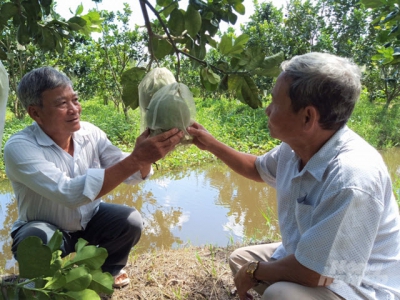Growing lemons and grapefruits with blockchain technology for export to Europe

Farmers in Hau Giang province are growing lemons and grapefruits according to blockchain technology and VietGAP, GlobalGAP standards to meet export demands to the EU.
Fruit trees are now an important commodity in the socio-economic development of Hau Giang province, with citrus trees accounting for nearly 14,500 hectares. Photo: HP.
Cultivation for exportation
Fruit tree is currently a commodity industry that plays an important role in the socio-economic development of Hau Giang province. However, the areas of fruit trees that are certified for food hygiene and safety, qualified for VietGAP and GlobalGAP standards is still in quite a humble figure.
In order to expand the area of citrus trees certified and qualified for export to strict markets, Hau Giang Department of Science and Technology has supported farmers and cooperatives to build production models, implemented the Project of building scientific and technical application models to produce green-skinned pomelo, Nam Roi pomelo, seedless lemon meeting Eupore exportation standards and traceability according to blockchain technology.
The project has had the Ministry of Science and Technology authorized local management, starting in 2022. M.Sc. Tran Ba Son, Director of the OCOP Bio-Fruit Cooperative, has been assigned to be the project manager, the cooperative members have applied it to actual production on the unit’s area.
“Farmers outside the cooperative, when participating in the Project and succeeding in production will be recognized as a cooperative member, accordingly forming a value chain for pomelo and lemon products from production, purchasing, preliminary processing, post-harvest preservation to consumption to the European market”, said Director of OCOP Bio-Fruit Cooperative Tran Ba Son.
Growing VietGAP pomelo on acidic, saline soils
Previously, the Science - Technology Information and Application Centre (under Hau Giang Department of Science and Technology) also succeeded with the Project of Building scientific and technical application models to develop the green-skinned pomelo cultivation area meeting VietGAP standards in Long My district. The project, which started at the end of 2017, has helped people change their production mindset, transform the crop structure accordingly, improve value, and increase income on the same arable land area.
The project was a success, but Ms. Trinh Hong Nhung, the female engineer in charge of the Project, still did not forget the difficulties during the first times the team implemented. Many people here did not believe that, for the local saline acid soil, it is possible to grow green pomelo trees that meet VietGAP standards. Therefore, not only did the team have to do technical training but they also had to convince farmers to reach an agreement to implement enthusiastically.
The scientific and technical application model to develop VietGAP standard green-skinned pomelo cultivation area in Long My district has brought great joy to farmers.
Farmer Tran Van Ton, who has more than 1 ha of green-skinned pomelo in the Project and is the director of Tien Nong Cooperative, in Hamlet 2, Vinh Vien Town, said: After a long time of hard work, now the farmers here have reaped the results as the green-skinned pomelo orchards are harvested, bringing high economic efficiency.
By strictly applying food-safety pomelo production processes, nearly 22 hectares of green-skinned pomelo belonging to farmers in the Project were awarded VietGAP standard certificates. With this certification’s help, the pomelos here can increase their competitiveness in the market and form a source of high-quality products, meeting domestic demand to export to Europe.
Up to the present date, Hau Giang province has had 8 certified fruit tree products, including: Nam Roi pomelos of Phu Thanh and Hau Giang, Nga Bay king orange, Cau Duc pineapple, Hau Giang seedless lemon, and Long Tri sugar tangerine, Phung Hiep tangor, Hau Giang sand mango, Hau Giang soursop.
Related news
 Poultry consumption faces difficulties, farmers reduce flock size
Poultry consumption faces difficulties, farmers reduce flock size Consumption halts, farmers reduce flock size. Many breeds cannot be released, farm owners are forced to keep them for commercial farming
 Rice seed enterprises find ways to adapt to 'the Covid times’
Rice seed enterprises find ways to adapt to 'the Covid times’ Using the form of sales promotion and online customer consulting, focusing on the local market, rice seed production and trading enterprises still can stabilize
 Loc Troi takes soil samples for project on 'Improving the quality of tropical fruits'
Loc Troi takes soil samples for project on 'Improving the quality of tropical fruits' The project on “Improving the quality of Vietnamese tropical fruits” is a core activity in the framework of cooperation between Vietnam and the Netherlands.